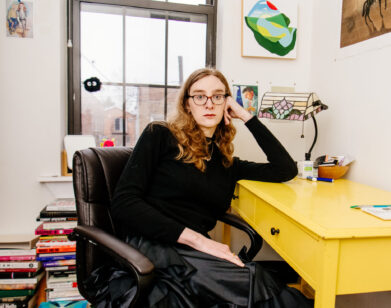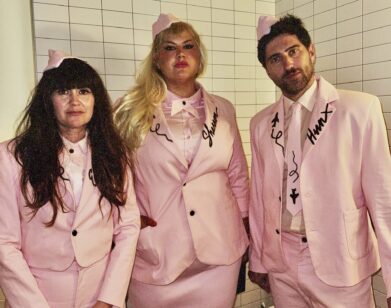LOS ANGELES
John Tottenham on His Debut Novel Service, an Ode to Bookstores and Bohemians
Los Angeles’ Stories Books is both an oasis in an otherwise chaotic Echo Park and, as the writer John Tottenham says, “the noisiest bookstore ever.” It’s a hub for twelve steppers that happens to serve alcohol; a highfalutin community center; a relatively new shop that feels ageless; and a second home to me and many others. When Tottenham and I both worked there, he as bookseller and I running events, you could often find us drinking a beer and comparing notes about literature while the Los Angeles literati, lowly and acclaimed alike, held readings outside under the echoes of buskers, Dodgers fans, LAPD helicopters, and Aimee Semple McPherson’s Angelus Temple.
After a few years back in New York, I returned to L.A. this past March and caught up with Tottenham at his apartment down the street, a magical and peaceful place filled with California light, rare vinyls, and, of course, stacks of books. We fell into a familiar irreverent rhythm while discussing his long-awaited debut novel Service, out this month from Semiotext(e), which follows a journalist named Sean as he endures middle age working at a bookstore not unlike Stories. The author of three previous books of poetry, Tottenham is well known in the city’s artistic quarters for his riotous and pithy readings, and the novel marks the next chapter in his lifetime of bohemian pursuits. Before its release, we touched on his artistic youth outside London and later work in music down South, but mostly on the writing life: its unheralded drudgery, the encroachment of gentrification, yellow drugs, and breaded fish from Trader Joe’s. The publication of his first novel, Tottenham quipped, is merely an advancement to “a different level of failure.”
———
CHRIS MOLNAR: What did an ideal life look like to you when you were a kid? The goal of being an unreconstructed bohemian, what was that?
JOHN TOTTENHAM: I guess I weaned myself into that kind of culture at quite a young age, being obsessed with the Beats and all that when I was 15. I never re-considered joining the straight world at all.
MOLNAR: How does art figure into this for you? You’re a prolific artist.
TOTTENHAM: Somewhat. I got a degree in fine art. I should have stuck with that, honestly. It’s a much more enjoyable, relaxing, and potentially lucrative pursuit. But there are thousands of artists who are much better than me and I don’t really have anything new to say. If I didn’t do the writing I do, nobody else would do it, for better or worse. I carved out a little niche for myself, one that mostly goes unnoticed and that nobody else would want, understandably. But I imagine, in my later years, just renouncing literature and sitting around painting all day. That would be a nice way to watch the sun go down.
MOLNAR: So writing was always something that was on your mind.
TOTTENHAM: It was the easiest thing to do. It shouldn’t be considered that at all, because some people think that’s what poetry is. People don’t regard it as a discipline; they just regard it as an excuse to express themselves.
MOLNAR: How much does the book track to your life?
TOTTENHAM: Because it’s set in a recognizable reality, people are going to assume it’s strictly autobiographical, and I’m already getting sick of having to explain that [it’s not]. 95 percent of it is purely fictional. It’s just reality as a point of departure into fiction. I need that basis in reality in order to create a fiction, but everything’s exaggerated and invented.
MOLNAR: I guess the part that isn’t invented would be that basic idea that you’re—
TOTTENHAM: Well, you could mention the fact that we were employed together.
MOLNAR: We both worked together at the bookstore, and reading it years later and still working in a bookstore myself, I think that this is the bookstore novel in a way. Nothing that I’ve ever read gets to the day-to-day experience that I have as a bookseller. And I show this to any bookseller that I know, just the first two pages, and they’re in it. You call it an honorable profession, but there’s a little resentment. How long have you been working at Stories?
TOTTENHAM: Since it opened. For 15 years. Stories has now become one of the oldest, most venerable establishments in the whole neighborhood.
MOLNAR: It’s remarkable because, given how old it is, you’d think it’s fucking City Lights. There’s hundreds of people whose entire lives are based around malingering there. It’s really unique as a bookstore. You’re not just slinging books. This is a neighborhood.
TOTTENHAM: It’s a cafe too. It’s the noisiest bookstore ever. You usually go to a bookstore and there’s a hush when you enter, but this one is the opposite.
MOLNAR: Yeah, but it’s positive. They’re just excited. I mean, they’re going to have to keep you working if people are going for you in the book.
TOTTENHAM: I don’t know, maybe it won’t make any noise outside Echo Park at all. I just hope it has some sort of life outside of this media that it’s set in.
MOLNAR: I think it can. It’s almost devious to write about booksellers that way because then they’ll all carry it.
TOTTENHAM: It’s funny you mention that because that was the thinking that the English publisher had, so their cover is going to have a drawing of the exterior of a bookstore on it.
MOLNAR: How did you choose this cover?
TOTTENHAM: It’s almost an exact replica of the cover of the third X record, except I got Adam Roth to design it. He did that from a photograph I took outside that window.
MOLNAR: What drew you to L.A. in the first place?
TOTTENHAM: There are some writers, Fante and Bukowski and Kerouac, that young people pick up on and can relate to. That’s very pleasing and gratifying. I think young people do respond to my stuff, even the poetry. Did you hear the book got picked up in England by Serpent’s Tail?
MOLNAR: Oh, great. How did that happen?
TOTTENHAM: Well, Colm Tóibín sent it over there. It had to go through a lot of hands, but they’re publishing it in the fall. They only handle a couple of other Semiotext(e) authors. They published Chris Kraus and Constance Debré and László Krasznahorkai and Joy Williams. The letter I got back from the woman said the young readers had been particularly responsive to it, so that was interesting. It’s great when very young people relate to one’s work and when one could factor into their development in that way.
MOLNAR: So much of your work is about feeling like you’re failing. Does this book feel like a breakthrough?
TOTTENHAM: Well, nothing’s really happened yet. I’m just going to advance to a different level of failure, probably.
MOLNAR: I think that might be the secret to success, always advancing to new levels of failure.
TOTTENHAM: My stove’s broken, my oven’s broken. My diet is breaded fish from Trader Joe’s. I subsist on it every day. I feel like I’m not eating properly if I’m not having my fish and veg every lunchtime.
MOLNAR: How long have you been in this neighborhood?
TOTTENHAM: Over 20 years. I’ve seen it change a lot. The whole bloody book is set in Echo Park. How do you think the gentrification aspect was handled?
MOLNAR: I thought it was good. I feel like you’re very direct about it, but not in a way that’s pandering to the reader. You actually get a panoramic view of Echo Park and its environs in a few paragraphs and I think it’s valuable. A lot of time when people write about gentrification, it’s from a position of privilege and it doesn’t feel honest, in a way.
TOTTENHAM: Well, the character in the book is selling his house and it’s gone up in value 10 times. He claims he’s going to only sell to somebody who’s going to enhance the neighborhood and he ends up selling it to a movie star.
MOLNAR: Gentrification is a broader thing, but it’s also one person at a time, and you capture that. But you can’t escape it in any city now just because everything is so immiserated. Where did you live before L.A.?
TOTTENHAM: I lived in New Orleans for three years. I was obsessed with the South. I had to get it out of my system.
MOLNAR: Why did you leave?
TOTTENHAM: I worked for a record label. I was down there handling the blues reissues and I traveled around Mississippi a lot. I was obsessed with all that stuff. I still am to some extent, but not in such a romantic way. I had a two-story house there for $150 a month, so it was not in the best neighborhood, whatever that means. It was in the worst white slum in uptown New Orleans.
MOLNAR: What do you think about where you’re from? Would you talk shit about it?
TOTTENHAM: Absolutely. I do talk shit about it. I was born in London, but raised in the country in the most idyllic, bucolic surroundings humanly imaginable, in a little isolated village. It was only 34 miles from London as the crow flies, but very inconvenient for public transport. So frequently, we’d spend the night in London just walking the streets after a show until the trains left the next morning.
MOLNAR: You have such a deep connection to the music scene here.
TOTTENHAM: That’s true, but musicians are more fun to hang out with than writers or artists, aren’t they?
MOLNAR: I mean, if there’s integrity to being a writer, it’s also in part because it’s so fucking boring and the people can be boring, too.
TOTTENHAM: Well, it puts you in a strange state of mind. If you’re like me, you spend every morning in complete isolation writing for three or four hours with every communication down. Then you emerge. You have these lengthy stretches of solitude. To me, writing is meditation. I enter a meditative state when I’m doing it. I don’t need meditation or psychoanalysis.
MOLNAR: Yeah, it makes your work sound more woo woo than it is, but there’s a repetition of themes that lets your brain breathe and circle around a certain kind of interior rhythm, which is what meditation is. That’s what is so appealing about your poetry, and the way that you present it reflects that.
TOTTENHAM: Yeah. I didn’t get any edits on that book.
MOLNAR: None?
TOTTENHAM: No editorial guidance whatsoever, and that’s fine.
MOLNAR: How did it come about? You just gave the book to Hedi [El Kholti]?
TOTTENHAM: Yeah, basically. It’s a bit of an anomaly in the Semiotext(e) catalogue. I think he was one who said, “It’s easier to sell a book by a middle-aged gay loser than a middle-aged straight loser.”
MOLNAR: We’ll see. I think part of what will build you a following is, who else is doing it?
TOTTENHAM: How do you feel about the drug stuff in there? I made a pact with myself not to explain anything, and that’s why I left it all vague in the book. I don’t want people treating it like a who’s who. Some people we know, writers, might just treat it as a guessing game.
MOLNAR: Well, I think it’s durable in that way because it’s built to be slippery. All it does is open more questions.
TOTTENHAM: It rails against the drug memoir epidemic, and then it actually turns into a little bit of a drug memoir. That’s one of the ironies.
MOLNAR: But the most annoying thing about drug memoirs is that it’s the exact same plot every time. It’s not really a drug book in that way, it feels more like real life. Not to pry or anything, but how much of that is invention?
TOTTENHAM: I’m still doing it.
MOLNAR: The yellow pills? Did you find a new source?
TOTTENHAM: I made all that up, obviously. I’m not going to fucking railroad my drug dealer in it. I mean, a lot’s happened since then. It’s Los Angeles, 2016 to 2019. I finished it almost five years ago at the beginning of COVID. I mean, it was 97,000 words when I brought it in, and Semiotext(e) said, “Throw out 17,000 words.” I threw out 5,000 words and they didn’t even notice. It’s not all that long. It’s only 328 pages.
MOLNAR: What did you throw out?
TOTTENHAM: Actually, it forced me to remove a few passages I was real queasy about. I mean, there’s still some things that make me cringe or whatever.
MOLNAR: But it feels like it’s purposeful, in order to paint a certain picture of an alter ego. In the way of a good novel, it draws you in because you trust the narrator. It’s not all self-flattery.
TOTTENHAM: I got a bunch of outtakes. I could actually throw them up on the Substack. That might be amusing. What’s great is doing these word checks on the computer, because I’ve noted all the words that I overused.
MOLNAR: One thing that I find so great about your work, like your Artillery articles, is you have the best names. How do you come up with them?
TOTTENHAM: I can’t give all my secrets, but I’ll tell you something funny. All of the names in my current Substack articles are taken from various books on the JFK assassination. No one’s ever going to figure that out.
MOLNAR: That’s gold. I feel like you know a Tottenham name when you see it, but you don’t know why you know it’s a Tottenham name. That’s part of why [Thomas] Pynchon is good, all the goofy names and stuff.
TOTTENHAM: There are actually some names in the novel I’m not very pleased with, though the main names are pretty good. I’ve always liked the name Mitchell, so I used that for one of the characters. Some of the names were just very plain. One character’s called Bill. What’s the point of going through all the trouble of inventing a name for characters who only appear once?
MOLNAR: I remember when you didn’t want me to mention the bookstore in your bio when you were at the event in Brooklyn last year. I feel there is this mystique, a whole mythos about John Tottenham, because you’re careful about what you talk about, but this seems like a huge window, even if it’s obviously fictionalized in so many ways.
TOTTENHAM: I mean, obviously that book is going to be sold at Stories Books, and people will be in there reading it in my presence without knowing. I don’t know how much longer I’ll be there, anyway.
MOLNAR: What are your plans?
TOTTENHAM: It’s a sad question, isn’t it? Maybe I’ll start making money on Substack. I’m going to open a paywall at some point. I meant to start doing this at least six months ago, but I dragged my ass about it because I wanted to build up more momentum before the novel came out.
MOLNAR: Is there more that you want to publish from what you’ve been writing?
TOTTENHAM: There’s so much stuff. I mean, if I died and they opened my computer up, nobody would know it. I’ve got endless files and documents that only I know where they are, and these fucking diaries too, but it’s unpublishable. Those are the equivalent of what people do on their cell phones. I’ve got an amazing collection of other people’s quotations. Every book I’ve read since I was a kid, I’ve just copied down lines that I liked. I should compile a companion. We’ve got to keep the ball rolling, I guess.
MOLNAR: I want new Tottenham.
TOTTENHAM: What do you want? You want a travelog? I have travel diaries of my solitary jaunts around the South and the Southwest in the ’90s.
MOLNAR: I’d love to read it. When did you start writing?
TOTTENHAM: I’ve always written, but like the character in the novel, I said I wasn’t going to do anything seriously until I turned 30. I didn’t know what people write about before then. I’m just going to accumulate experience and live. And I sort of did that, but I dragged it out further.
MOLNAR: I relate to that. I still feel like I don’t really have any particular direction. But you can’t publish a book about having that sort of inertia because it negates itself.
TOTTENHAM: I’m looking at some notes: “I was waiting to be able to address a subject with authority. I waited a long time, until waiting itself became the subject, and frankly, it wasn’t worth the wait.” The thing is, a lot of these people don’t enjoy writing, and you can tell that when you read them.
MOLNAR: That’s why they stop doing it.
TOTTENHAM: There’s no pleasure in the prose. Like Cormac McCarthy is just turgid, forcing it out.
MOLNAR: Like somebody has him at gunpoint with a thesaurus or something.
TOTTENHAM: People who complain don’t want to write; they want to have been read. They have nothing to say, they just want to be heard. But I enjoy it—it’s my favorite time of the day.
MOLNAR: What was the last new book that you read?
TOTTENHAM: Nothing, I don’t read any contemporary fiction. What am I supposed to do? Read Sally Rooney? She’s in the book, of course.







